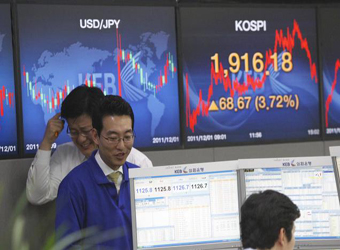Japan markets were an outlier, however, soaring after reopening after a public holiday.
Japan’s Nikkei 225 rose 1.55 percent as markets played catch-up following the long weekend. Exporters, trading houses and retailers notched gains as the dollar held onto overnight gains against the yen.
Down Under, the S&P/ASX 200 advanced 0.08 percent, with the heavily-weighted financials sub-index climbing 0.28 percent.
South Korea’s benchmark Kospi index shed 0.11 percent, with tech stocks giving up some gains made in the previous session. Samsung Electronics fell 0.99 percent after rising to a record high on Monday.
Greater China markets edged down. The Hang Seng Index slid 0.06 percent and mainland markets pared earlier gains. The Shanghai Composite lost 0.29 percent and the Shenzhen Composite traded 0.039 percent below the flat line.
Pan pointed to how regional markets had risen on Monday mainly due to confidence from U.S. markets, but risk events in coming days “made the appeal for caution ahead.”
Investors shifted their attention to the Fed as the Federal Open Market Committee begins a two-day policy meeting on Tuesday.
The central bank is widely expected to leave interest rates unchanged when it announces its decision on September 20, but investors are awaiting details on its reduction of $3.7 trillion in Treasurys and mortgage-backed securities bought during the financial crisis.
Ahead of the event, the dollar held onto gains after creeping higher overnight, with the greenback trading near an eight-week high. The U.S. currency last fetched 111.54 yen. Meanwhile, the dollar index, which tracks the U.S. currency against a basket of currencies, was mostly flat at 91.936.
“Speculation around the impending FOMC meeting is … driving the U.S. dollar, with markets eyeing both the unwind of the balance sheet and any tweaks to the dot plot,” Felicity Emmett, senior economist at ANZ, said in a note.
Stocks on Wall Street closed higher on Wall Street, with the Dow Jones industrial average rising 0.28 percent, or 63.01 points, to close at 22,331.35 — its fifth consecutive record close.
Elsewhere, the pound was steady after being pushed lower overnight following Bank of England Governor Mark Carney’s Monday comment that future hikes in interest rates could be “at a gradual pace and to a limited extent.” Sterling traded at $1.3515 at 12:30 p.m. HK/SIN, compared to the $1.358 handle seen during Asian trade on Monday.
In corporate news, Chinese search company Baidu announced over the weekend it had hired Herman Yu as its chief financial officer. Yu was formerly the CFO of Weibo, a microblogging platform. In a statement addressing the appointment, Baidu CEO Robin Li said the company was looking forward to entering “the next stage of growth in the AI [artificial intelligence] era.”
Meanwhile, the institutional tranche of Chinese online insurer ZhongAn Online Property and Casualty Insurance’s initial public offering has been oversubscribed, Reuters said Monday. The insurance company is expected to debut on the Hong Kong exchange September 28, according to Reuters.
In economic news, the Reserve Bank of Australia’s minutes showed the central bank was positive about resilience in the country’s jobs market, but expected wage growth to remain slow, Reuters said. The RBA was also concerned about household debt levels and strength in the Australian currency, according to Reuters.
The Aussie dollar, which had firmed in the lead-up to the release of the minutes, fetched $0.7965 at 12:30 p.m. HK/SIN. The currency had spiked as high as $0.7993 immediately after the release of the minutes.
On the energy front, oil prices were steady. U.S. crude edged down by 0.04 percent to trade at $49.89 a barrel and Brent crude lost 0.16 percent to trade at $55.39.
Source: CNBC


